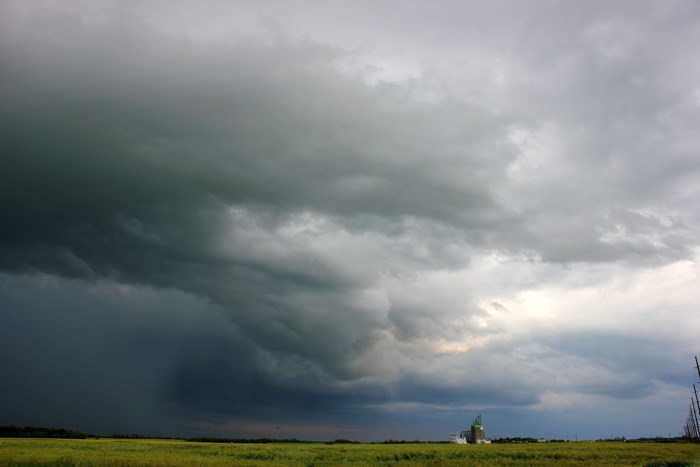It came down hard, it came down fast and it left Yorkton reeling with 100-year floodwaters for the third time in six years.
Some 60 mm of rain fell on Yorkton in less than an hour Sunday night, overwhelming the city’s storm sewer system and creating shallow lakes in various places around the city, most notably on Broadway Avenue where some businesses remained closed as of Tuesday morning.
There was also a tornado that ripped through the Rural Municipality of Wallace just about 10 km south of Yorkton damaging buildings, uprooting trees and tearing up power poles that led to a power outage in the Rokeby and surrounding areas.
Some places were pummeled by hail as big as golf balls.
Fire chief Trevor Morrisey said in terms of his department’s response, this storm was relatively minor.
“The biggest thing we needed with this one was time to let the system catch up,” he said. Helping that cause were residents getting out and keeping storm drains clear of debris.
“They were really great,” Morrissey said.
Exacerbating the situation were people out driving around.
“That’s a real sore spot,” he added.
Yorkton mayor Bob Maloney was less diplomatic.
“One thing I’m getting really hostile reports about is people driving in these circumstances,” he said. “People need to have some common sense and stay off the streets.
In general, Maloney is at his “wit’s end,” he said, when it comes to severe weather.
“What do you do with three inches of rain in 20 minutes?” he asked. “I grew up here and I’ve never seen storms like this, I don’t know what we’re supposed to do.”
Since 2010, the City has taken some steps to mitigate, including a retaining pond between Laurier and Agricultural Avenues, a second one at Dracup Avenue and Darlington Street and upgrades to the storm sewer system. The system still does not have the capacity, however, to handle that amount of rain that quickly.
Nevertheless, the mayor did not consider calling a state of emergency.
“We really don’t have to do that anymore,” Maloney said. “All we have to do is apply to the province for PDAP (Provincial Disaster Assistance Program).”
He said Lonnie Kraal, city manager, has already been in touch with the Province to make arrangements.
The City is looking at the long-term, he said, but also recognizes there are immediate needs.
“We have some hot spots,” he said. “They’ve been pointed out to us too often, unfortunately, so we have to come up with some short-term solutions.”
He suggested they might have to build some pumping stations in key areas such as Laurier and Broadway and South Gladstone.
The rain fell between 4 p.m. and 5 p.m. and the flooding had pretty much receded by 9 p.m., but not before significant damage was done in some of those areas.
Maloney talked to residents who had five feet of water in their basements and videos circulated around social media of water pouring out of downtown businesses, such as Tapps Brewing Company.
The Yorkton Public Library once again took on significant water, but Helen McCutcheon, director of the Parkland Regional Library, said the collection was, thankfully, not affected this time. In 2010, the library lost 25,000 items, nearly 15 per cent of its collection.
She explained the carpet was drenched and had to be removed along with shelves that were attached to the wall. She said they expect to be closed until August 8.
Sunrise Health Region was also affected. Some residents of the Yorkton and Area Nursing Home had to be temporarily moved because of flooding there, but they were quickly returned to their rooms, said Sharon Tropin, director of communications for the health region.
She said the hospital also experienced flooding in some areas, but there was no interruption to services. Remediation is underway in both facilities.
An overall estimate of the damage has yet to be assessed, but local insurance agencies were busy Tuesday.
Maloney is very concerned that more severe weather is becoming the new normal.
“Rates will go up,” he said. “You have storm incidents, then there’s claims, the rates go up, that makes the insurance more expensive, which means some people are going to be saying, ‘I can’t afford to insure.’ It affects property values; it affects a lot of things. For cities, we’re going to need the province to get involved at some point in time, because, all the pipes in the ground are our responsibility, but at the end of the day, we’re protecting property.”




